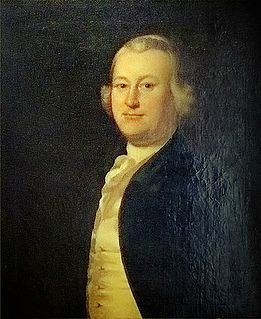A Quote by John Locke
There cannot any one moral rule be proposed whereof a man may not justly demand a reason. Every man has a property in his own person. This nobody has any right to but himself. The people cannot delegate to government the power to do anything which would be unlawful for them to do themselves.
Related Quotes
Thirdly, the supreme power cannot take from any man any part of his property without his own consent: for the preservation of property being the end of government, and that for which men enter into society, it necessarily supposes and requires, that the people should have property, without which they must be supposed to lose that, by entering into society, which was the end for which they entered into it; too gross an absurdity for any man to own.
..every Man has a Property in his own Person. This no Body has any Right to but himself. The Labour of his Body, and the Work of his Hands, we may say, are properly his. .... The great and chief end therefore, of Mens uniting into Commonwealths, and putting themselves under Government, is the Preservation of their Property.
By Liberty I understand the Power which every Man has over his own Actions, and his Right to enjoy the Fruits of his Labour, Art, and Industry, as far as by it he hurts not the Society, or any Members of it, by taking from any Member, or by hindering him from enjoying what he himself enjoys. The Fruits of a Man's honest Industry are the just Rewards of it, ascertained to him by natural and eternal Equity, as is his Title to use them in the Manner which he thinks fit: And thus, with the above Limitations, every Man is sole Lord and Arbitrer of his own private Actions and Property.
Condemn no man for not thinking as you think. Let every one enjoy the full and free liberty of thinking for himself. Let every man use his own judgment, since every man must give an account of himself to God. Abhor every approach, in any kind or degree, to the spirit of persecution, if you cannot reason nor persuade a man into the truth, never attempt to force a man into it. If love will not compel him to come, leave him to God, the judge of all.
Government is necessary, but the only rights we can delegate to government are the ones we possess. For example, we all have a natural right to defend ourselves against predators. Since we possess that right, we can delegate authority to government to defend us. By contrast, we don't have a natural right to take the property of one person to give to another; therefore, we cannot legitimately delegate such authority to government.
It is self-evident that no number of men, by conspiring, and calling themselves a government, can acquire any rights whatever over other men, or other men's property, which they had not before, as individuals. And whenever any number of men, calling themselves a government, do anything to another man, or to his property, which they had no right to do as individuals, they thereby declare themselves trespassers, robbers, or murderers, according to the nature of their acts.
Any man knows when he is justified, and all the wits in the world cannot enlighten him on that point. The murderer always knows that he is justly punished; but when a government takes the life of a man without the consent of his conscience, it is an audacious government, and is taking a step towards its own dissolution.
I know that in many things I am not like others, but I do not know what I really am like. Man cannot compare himself with any other creature; he is not a monkey, not a cow, not a tree. I am a man. But what is it to be that? Like every other being, I am a splinter of the infinite deity, but I cannot contrast myself with any animal, any plant or any stone. Only a mythical being has a range greater than man's. How then can man form any definite opinions about himself?.
The influence over government must be shared among all the people. If every individual which composes their mass participates of the ultimate authority, the government will be safe, because the corrupting of the whole mass will exceed any private resources of wealth, and public ones cannot be provided but by levies on the people. In this case every man would have to pay his own price.
A man's natural rights are his own, against the whole world; and any infringement of them is equally a crime, whether committed by one man, or by millions; whether committed by one man, calling himself a robber, (or by any other name indicating his true character,) or by millions, calling themselves a government.
As Our Predecessors have many times repeated, let no man think that he may for any reason whatsoever join the Masonic sect, if he values his Catholic name and his eternal salvation as he ought to value them. Let no one be deceived by a pretense of honesty. It may seem to some that Freemasons demand nothing that is openly contrary to religion and morality; but, as the whole principle and object of the sect lies in what is vicious and criminal, to join with these men or in any way to help them cannot be lawful
The only proper, moral purpose of a government is to protect man's rights, which means: to protect him from physical violence - to protect his right to his own life, to his own liberty, to his own property and to the pursuit of his own happiness. Without property rights, no other rights are possible.



































